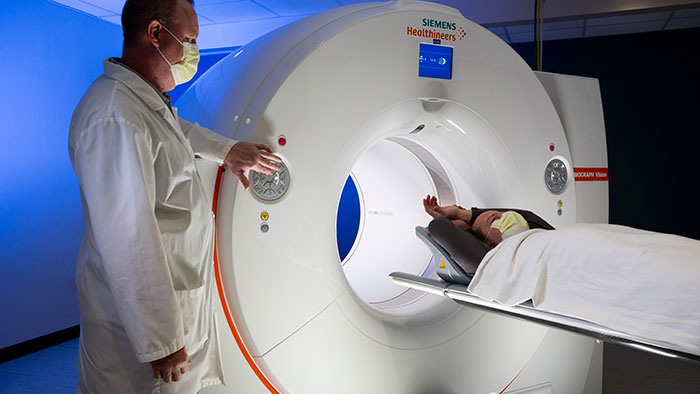Cancer Screening Services
Early detection saves lives. When abnormal tissue or cancer is found early, it is often easier to treat.

HSHS St. John’s Hospital utilizes a variety of screening tests to detect cancers and provide better opportunities for patients to obtain more effective treatment. Regular screening exams can greatly reduce your risk for certain types of cancers.
Types of Tests Include
As part of an ongoing effort to offer patients the most cutting-edge medical imaging technology available, St. John’s Hospital purchased the Biograph Vision, the next-generation PET/CT scanner. This PET/CT scanner enables clinicians to identify the smallest of lesions early as a result of the high resolution and image quality, which supports an accurate diagnosis and more personalized treatment options to our patients. The scanner is available to patients for screening with a physician’s orders.
This imaging test is often used for women who carry a harmful mutation in the BRCA1 gene or the BRCA2 gene because these women have a high risk of breast cancer and are at an increased risk for other cancers.
Colonoscopy, Sigmoidoscopy, and High-Sensitivity Fecal Occult Blood Tests (FOBTs) are offered at St. John's. These tests have all been shown to reduce deaths from colorectal cancer.
A Pap and HPV (Human Papillomavirus) tests are used to detect cervical cancer. These tests look for precancers and cell changes on the cervix. Early detection and identifying abnormal cells can mean intervention and treatment before they become cancer.
An Alpha-fetoprotein blood test is sometimes used, along with ultrasound of the liver, to try to detect liver cancer early in people at high risk of the disease.
A low-dose CT scan is used to screen for lung cancer. This has been shown to reduce lung cancer deaths among heavy smokers ages 55 to 74.
Learn more
Learn more
This method to screen for breast cancer has been shown to reduce mortality from the disease among women over the age of 40.
Learn more
Learn more
A transvaginal ultrasound is an imaging test which can create pictures of a woman's ovaries and uterus and is sometimes used in women who are at an increased risk of ovarian cancer.
A PSA (Prostate-specific Antigen) blood test, which is often done along with a digital rectal exam, is able to detect prostate cancer in men at an early stage.